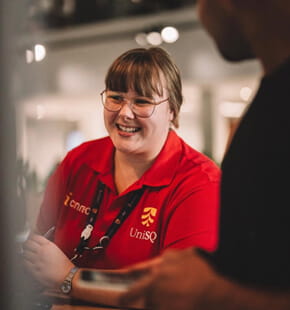Explore Early Childhood degrees
Undergraduate (your first degree)
An undergraduate degree is an academic program of study that leads to a qualification, such as an associate degree, diploma or bachelor's degree. It's typically the first degree you undertake when entering university or an additional degree you can take on if changing your career path.
- Springfield
- Toowoomba
- External
- Feb, Jun
- Springfield
- Toowoomba
- External
- Feb, Jun
- Online
- Feb, Jun
- Online
- Feb, Jun
Postgraduate (further study)
A postgraduate degree is an advanced qualification pursued after completing an undergraduate degree or significant work experience. It includes master's degrees, as well as postgraduate diplomas and certificates.
Research (higher degrees by research)
Research degrees are master's or doctorate/doctoral programs centred on in-depth study within a specific field, allowing you to conduct highly specialised research under the guidance of expert supervisors.
Studying at UniSQ
Frequently asked questions
UniSQ also offers the Bachelor of Early Childhood, which qualifies you to work with children (newborn through to five years old) and families in a range of early learning environments. This degree does not, however, qualify you for teacher registration.
An early childhood teaching degree provides the knowledge and skills necessary to teach children ages 0-8 cognitive, physical, social and emotional development.
The specific age groups you can teach will depend on which degree you complete and whether it leads to teacher registration.
UniSQ students enrolled in the Bachelor of Education or Master of Learning and Teaching program will be required to successfully complete both components of the LANTITE before being eligible to graduate. All students must provide evidence of an attempt at the LANTITE by the end of their first year, which is measured by eight courses or units of study.
UniSQ’s Bachelor of Education (Early Childhood) takes four years of full-time study to complete and our Bachelor of Early Childhood takes approximately three years to complete.
If you have a previous early childhood qualification from TAFE or another recognised provider, you may be eligible to receive credit for some courses and graduate sooner. At UniSQ, we offer various flexible ways to study, so you can study at a pace and convenience that suits your needs. You can choose to study full or part-time, online, on-campus, or a mix of both.
If you study part-time, the duration will be longer depending on your individual study load and commitments.
Yes, UniSQ offers flexible study options for early childhood degrees. You can study your early childhood degree online, on-campus, or a combination of both. You can also tailor your study schedule to suit your lifestyle, studying full-time, or one subject at a time, taking extra when life allows.
The majority of your Bachelor of Education (Early Childhood) can be studied online, with the exception of professional experience placements that will require you to gain hands-on experience in various educational settings. With multiple start dates throughout the year (February and June), you have flexibility in when you begin your studies and how you structure your learning around work and personal commitments.
Under Blue Card Services 'No Card, No Start' laws, if you are attending a professional experience placement in Queensland, you must hold a valid Blue Card or Exemption Card before you start. Your Blue Card must be valid for your entire placement and cannot have an expiry date at any time throughout your placement.
If you're completing placements outside Queensland, you'll need to meet the working with children check requirements for that state or territory. It's important to apply for your Blue Card early, as processing can take several weeks.
Through a combination of theory and professional experience placements, UniSQ education and teaching graduates are well prepared to adapt to the classroom environment and are highly sought after in the job market. UniSQ is also rated 5/5 stars for graduate starting salary (Good Universities Guide, 2026).
The Bachelor of Education (Early Childhood) is approved with the Australian Children's Education and Care Quality Authority (ACECQA) and the Queensland College of Teachers (QCT). You may also be eligible to receive recognition for prior learning if you have previous early childhood qualifications, helping you complete your degree faster.
Take your first step

UniSQ is collecting the personal information on this form for support for students and prospective students and for marketing purposes. By submitting this form, you consent to the terms of UniSQ's marketing privacy statement. Further information concerning privacy is available.
Welcome aboard! We've got your details.
Something doesn't look right. Try that one again.


